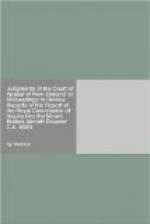A different comment upon paragraph 48 is central in this part of the case. It is very hard to understand why the chief executive officer of this airline should have had any duty to pass on for debate and public prejudgment the same material that in accord with his responsibility had been properly and immediately placed before the appointed official required and well equipped to assess it.
“Irrelevant” Documents
At the beginning of this judgment a different aspect of paragraph 45 is explained by contrast with the following paragraph 46 which correctly summarizes instructions given by Mr Davis for the disposal of surplus copies of documents lest they be leaked to the news media. In paragraph 46 it is explained by the Commissioner that “his instructions were that only copies of existing documents were to be destroyed. He said that he did not want any surplus document to remain at large in case its contents were released to the news media by some employee of the airline. The chief executive insisted that his instructions were that all documents of relevance were to be retained on the single file” (emphasis added). There was no evidence before the Royal Commission to any contrary effect. But in the preceding paragraph a different impression is given. The relevant part of paragraph 45 reads—
“He directed that all documents relating to Antarctic flights, and to this flight in particular, were to be collected and impounded. They were all to be put on one single file which would remain in strict custody. Of these documents”—
that is, all documents relating to the Antarctic flights—the sentence continues:
“all those which
were not directly relevant were to be destroyed.
They were to be put
forthwith through the company’s shredder.”
Then in paragraph 54 the actual instruction is taken into a further dimension where it is described as “this direction on the part of the chief executive for the destruction of ‘irrelevant documents’”. And one serious complaint made by the applicants about the Royal Commission Report is that what could be an understandable direction for the retention of one copy on a master file of all relevant documents has become an unacceptable instruction that irrelevant documents (related to the Antarctic flights nonetheless) should be destroyed. We think the complaint is justified.
At the same early stage of the Report the Commissioner gave his attention to the question as to what if anything was done about the suppression of documentary evidence. He said in paragraph 52:




